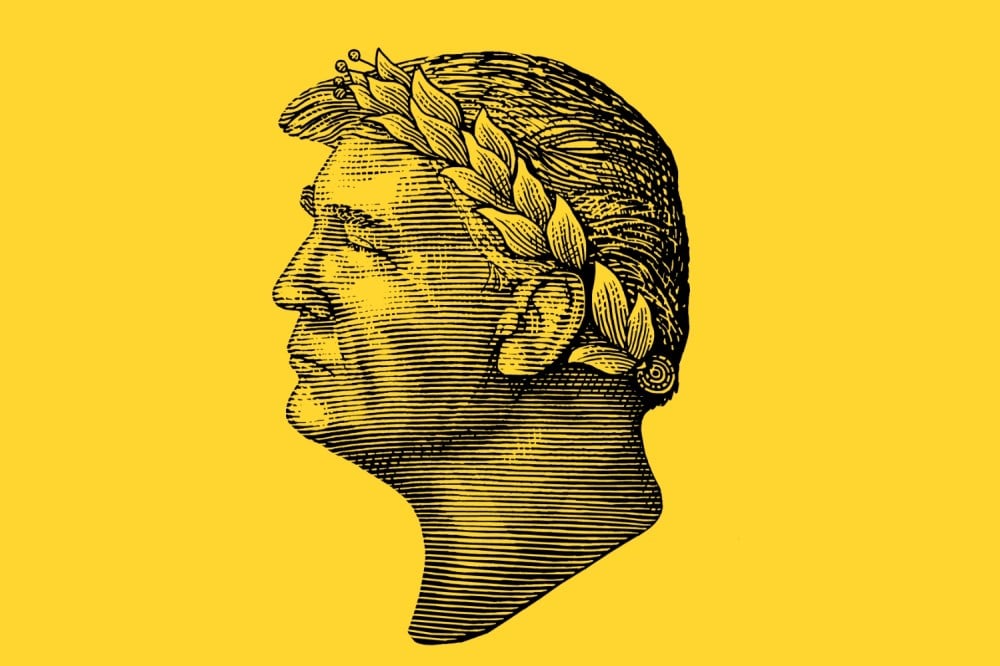In April, as the world economy reeled from U.S. President Donald Trump’s tariffs, Senate Minority Leader Chuck Schumer posted on X, “Nero fiddled. Trump golfed.” Schumer joined a long history of comparing Trump to ancient Romans. Trump is Augustus concentrating the power of the Republic in a single authoritarian individual, a cruel and capricious Caligula, a demagogue in the model of Tiberius Gracchus or Publius Clodius Pulcher.
But most often, he’s compared to Julius Caesar, who in 49 B.C. led his soldiers across the Rubicon, the river marking the border between the province of Cisalpine Gaul and the area directly controlled by Rome. In bringing a legion across the Rubicon, Caesar broke the laws limiting his power. According to the Roman historian Suetonius, on crossing Caesar declared, “The die has been cast.” After five years of civil war, he was declared dictator for life in 44 B.C. and famously assassinated soon after.
The parallels between Caesar and Trump have proved so attractive that the comparison has collapsed under its own weight and inverted itself. Caesar is now compared to Trump, with a 2017 production of William Shakespeare’s Julius Caesar and a 2023 BBC documentary series about Caesar’s dictatorship both explicitly conflating the two figures.
We don’t know the exact date when Caesar crossed the Rubicon, nor do we know precisely where. But Trump’s Rubicons have been many, as psychologist and writer Mary L. Trump, the president’s niece, has pointed out. Every few weeks, a pundit declares that Trump has crossed some Rubicon or other. The references are so frequent that, just days after Schumer’s post comparing Trump to Nero, historian Michele Renee Salzman published an impassioned piece in Zócalo Public Square titled “Stop Comparing Trump’s Lawbreaking to Caesar Crossing the Rubicon.”
Use of the Rubicon metaphor isn’t limited to critics of Trump. Rioters on Jan. 6, 2021, carried banners with the popular hashtag #CrossTheRubicon, hinting at the ubiquity of Rubicon rhetoric in far-right online spaces that I describe in my 2018 book, Not All Dead White Men. In 2022, Newt Gingrich explored in Newsweek whether the FBI raid on Mar-a-Lago was a Rubicon moment, and in 2024, the Washington Times published an editorial titled “Democrats cross the Rubicon with Trump guilty verdict.”
Salzman’s critique of the Rubicon metaphor is that it doesn’t go far enough. Caesar, she argues, wanted to basically maintain the Roman political system with himself in charge: “When Caesar crossed the Rubicon, his goal was specific and limited. Caesar had no desire to remake the republic nor to destroy the way Roman politics worked. He simply wanted to bring his army with him to run for election for consul.”
Trump’s ambitions, Salzman writes, are far wider-ranging: “Unlike Caesar’s limited goals in 49 B.C.E, Trump desires to bring widespread change to our republic—overturning everything from decades of foreign policy and lawfully constituted federal agencies to medical research, education, and the law.”
It isn’t difficult to pick apart a comparison between Trump and Caesar, if you so wish.
Both were populists, but Trump is also a historically unpopular president, with his popularity rating at 100 days the lowest in 80 years. Caesar, in contrast, had a wide base of support as both a generous patron and a renowned general. Both were extremely wealthy, but Caesar was well known as a brilliant military strategist and a man of learning, respected even by fellow polymaths such as Cicero, who peppered his letters to Caesar with erudite references to Greek literature. (Caesar may have really said, on his crossing, “let the die be cast,” a quote from the Greek comedian Menander.)
But such nitpicking seems, ultimately, somewhat beyond the point. Of course, Trump doesn’t perfectly resemble a dictator from a vastly different political system more than 2,000 years ago (even if both were a bit self-conscious about their thinning hair). Trying to predict what’s coming next by looking to ancient Rome is an understandable but pointless exercise.
As historian Rhiannon Garth Jones argues in her recent book All Roads Lead to Rome, there is a long, rich history of empires defining themselves in conversation with Rome and using Rome as a shorthand, a way to express imperial power. Rome’s meaning is, it seems, in the eye of the beholder.
What do all of these Rubicon comparisons amount to? Commentators seem to want to declare that this moment, this action, this event is a point of no return, heralding vast change. Maybe they’re right, although the lessons of historical events are often opaque to those living through them. Maybe, to Romans in the 40s, Caesar’s crossing of the Rubicon was also just one of a series of events that felt completely unthinkable, dissolving all agreed-on norms and rules.
Maybe they felt just as unmoored as we do, searching desperately for a historical comparison to help them make sense of their own times, finding a precedent for the unprecedented. According to the Greek historian Polybius, when the Roman general Scipio looked out at the ruins of conquered Carthage, he quoted a line from Homer about the inevitability of the fall of Troy; perhaps Caesar’s contemporaries did something similar.
To me, these comparisons speak to the paralyzing but tantalizing futility of situating the present moment in conversation with the classical past. As with most comparisons, comparing Trump and Caesar ultimately tells you more about the person making the comparison than it does about either of the leaders involved. The Rubicon metaphor is so overused that, while it might be important for some people, it’s past the point of being meaningful as a way to explain the feeling of cherished democratic norms being transgressed on a near-daily basis.
The lesson of Rubicon metaphors may be this: When they’re utilized by the left, they signal discomfort with Trump’s actions. When used by the right, they signal a documented willingness to take collective action, even if it comes to violence. Maybe rioters holding banners understand the lessons of history better than pundits and historians do. Only time will tell.
The post An American Caesar appeared first on Foreign Policy.




